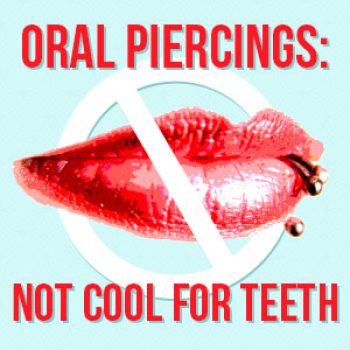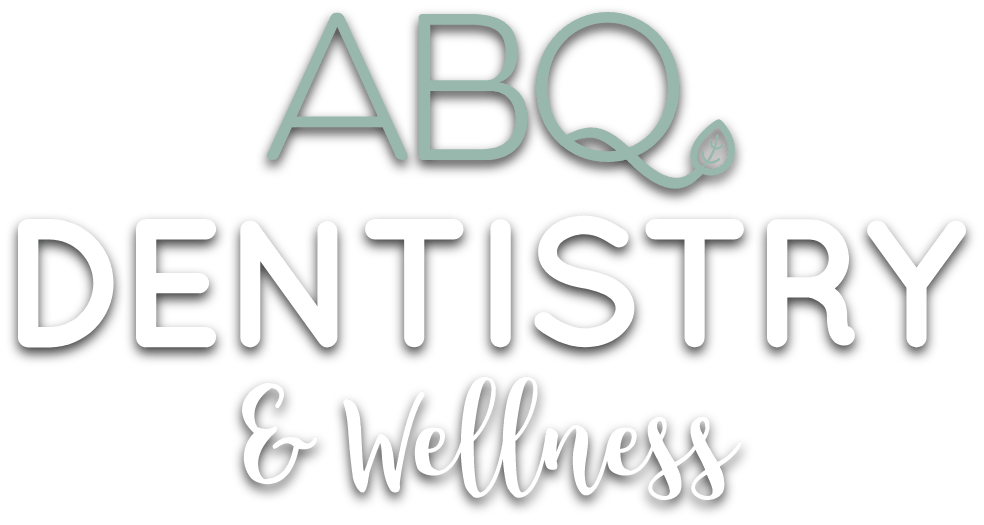Community
Oral Piercings: Not Cool for Teeth
 Remember that guy with the lip ring you had a crush on in high school? I wonder how his teeth are doing now. Don’t get us wrong—at ABQ Dentistry and Wellness, we’re all about the freedom of self-expression, and if body modifications like tattoos and piercings are your thing, we support you. However, as your dental health professionals, we strongly advise against oral piercings specifically because they can be really harmful to your teeth—and we want you to keep your teeth healthy, so you can continue to express yourself with your beautiful smile.
Remember that guy with the lip ring you had a crush on in high school? I wonder how his teeth are doing now. Don’t get us wrong—at ABQ Dentistry and Wellness, we’re all about the freedom of self-expression, and if body modifications like tattoos and piercings are your thing, we support you. However, as your dental health professionals, we strongly advise against oral piercings specifically because they can be really harmful to your teeth—and we want you to keep your teeth healthy, so you can continue to express yourself with your beautiful smile.
Oral piercings refer to any piercing in or around the mouth. In the old days, the only options were the more traditional tongue or lip piercings, but today there are more options than you can shake a stick at. If it’s in your mouth, you better believe someone has pierced it. From the tongue web piercing to the vampire or upper frenulum piercing, to the gum piercing, venom bites, snake eyes, smiley piercing, frown piercing, and even the uvula piercing—yes, apparently you can pierce your uvula. There’s even a “dental piercing” which is not necessarily a drilled hole, but jewelry that is embedded onto the tooth surface. But of course, we don’t recommend any of these, so don’t get any ideas!
ABQ Dentistry and Wellness is here to share some reasons oral piercings are not cool for teeth.
Infection
If you’ve ever had your ears or anything else pierced, you understand the risk of infection and the importance of keeping your new piercing clean. However, oral piercings have a much higher rate of infection because of their location in or around the mouth. The mouth is home to millions of bacteria (some are good, others are extremely dangerous) that have the potential to enter the piercing site and cause infection.
According to the American Dental Association, secondary infections can result in serious illness including blood-borne hepatitis, angina, and herpes. With oral piercings, there is always a risk of infection, but particularly in the few weeks following the initial piercing. Signs of infection include swelling, pain, fever, chills, shaking, or a red-streaked appearance around the piercing. Contact us right away if you notice signs of infection.
Tooth & Gum Damage
One of the most common dental problems associated with oral piercings is tooth and gum damage. It’s easy enough to damage your teeth and gums already, whether from chewing ice or brushing your teeth too hard. Add a piece of metal jewelry into the equation and you’ve got a recipe for disaster. Oral piercings can irritate the gum tissue, and cause enamel damage in the form of cracks, chips, scratches, and tooth sensitivity.
If you’ve had any dental work done—including fillings or crowns—oral piercings can damage these as well, so if you don’t want to spend more money and time in the dental chair having your dental work repaired, we recommend choosing a non-oral piercing—if you’ve really got the urge to pierce something.
Nerve Damage
Following a tongue piercing, it’s not uncommon to experience numbness due to nerve damage; this is usually temporary, but can sometimes be permanent. Nerve damage can affect your sense of taste, as well as the movement and function of your mouth. Tongue piercings have also been known to damage the tongue’s blood vessels, which can cause serious blood loss.
Other Hazards
Allergic reactions are always possible with piercings. Some folks are allergic to certain types of metals, and some are just hypersensitive to certain metals. Tongue piercings can create increased saliva production, which can cause excessive drooling and can also affect your speech patterns causing a lisp. Not as appealing as you thought it was going to be, eh? Finally, oral piercings can be a problem when it comes to dental care because they interfere with x-rays and prevent us from seeing the full picture of your mouth.
Our Advice
If you already have an oral piercing, we do recommend removing it, but we understand if it’s become a staple of your signature look. If you’re keeping or still considering getting an oral piercing after reading this article, at least read our advice on how to care for it and avoid or minimize dental problems.
- Choose a jewelry style that works well with the location in your mouth.
- Gauge your jewelry accordingly. Longer or bigger jewelry may be necessary at first due to swelling, but once the swelling goes down the jewelry should be swapped or adjusted to fit.
- If you choose metal jewelry, make sure you’re aware of any sensitivities you may have and make sure the jewelry conforms to surgical implant grade standards.
- Use polymer balls to reduce the risk of damage, and select a smaller ball for the underside of the tongue to reduce contact with this soft tissue area.
- Keep the piercing clean and free of debris by brushing and flossing diligently and rinsing with mouthwash after every meal—contrary to what you might believe, alcohol-free is a better option because alcohol is drying, and a dry mouth is more susceptible to infection.
- Avoid playing with your jewelry or moving it around in your mouth, including chewing on it or clicking it around against your teeth. Be gentle and aware of how the jewelry moves when you speak and eat.
- Check the tightness of your jewelry (with clean hands) regularly to ensure it’s secure so you don’t swallow or choke on it.
- If you participate in sports, you may want to remove your jewelry while playing, and you should always wear a mouthguard.
- Maintain your diligent oral hygiene routine and see us at ABQ Dentistry and Wellness regularly so we can catch any small problems before they progress.
We hope this article has made you think twice about oral piercings. There are plenty of other places to pierce, after all, and plenty of other ways to express yourself that don’t involve permanently damaging your mouth. If you already have an oral piercing or are considering getting one, we hope you’ll follow our advice on how to best minimize the damage.
If you have any more questions about oral piercings or anything else related to oral health, we would love to speak with you. Contact your Albuquerque dentist, Dr, Shamaine Giron at ABQ Dentistry and Wellness today!
The content of this blog is not intended to be a substitute for professional medical advice, diagnosis, or treatment. Always seek the advice of qualified health providers with questions you may have regarding medical conditions.










